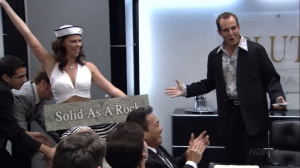“When pride comes, then comes disgrace, but with humility comes wisdom.”
– Proverbs 11:2
In politics, disgrace does not follow pride and there are no such things as humility or wisdom. Partly this is because politics attracts the type of people who “think that it is not the system which we need fear, but the danger that it might be run by bad men,” as Friedrich Hayek wrote in The Road to Serfdom. The belief that there is nothing wrong with a bloated, oppressive, administrative bureaucracy actively engaged in managing the economy should be woefully outdated and subject to mockery. Alas, this idea retains decent heft in America and the broader West. Worse is the belief among federal bureaucrats that they are called to do important work on behalf of “society.” Worse still is they believe they are “public servants” arbitrating what’s fair and proper in civic life. But the absolute worst aspect of it all is how proud they are to play petty authoritarian. Whether it’s an IRS middle manager, an EPA busybody or an EEOC scold, American life is now regulated to the point of oppression by a class of elite social justice warriors who are all too happy for the opportunity. This is the subject of Charles Murray’s new book, By the People, which calls for a form of conservative civil disobedience by way of noncompliance with the regulatory state. But the left is exceedingly proud of their regulatory state – they did build that, and over a long period and a “long march.” They are never going to part with it willingly or lightly; their identity depends on its preservation.
If only this was confined to the left. The reality though is that the faction of conservatives who base their identity more or less on American global power are similarly in thrall to pride. The spectacle that was Jeb Bush fumbling soft ball questions on the Iraq War last week was both instructive and foreboding. We got crystal clear confirmation that Jeb is surrounded by the same elite cadre of foreign policy hawks as was his brother George. We got warning that proponents of the war had undergone a level of soul-searching akin to that of Sauron after his first defeat. I would bet everything I own that without the advice of his team, Jeb would have answered Megyn Kelly’s “knowing what we know now” Iraq hypothetical with an unequivocal “no.” But Jeb is not without that advice, because that advice comes from a donor class and an establishment GOP mostly wedded to the idea that the Iraq War was basically the right call.
Hovering in the ether ever since the Democrats’ 2006 midterm romp is an obvious political truth, one which precious few on the right want to accept. The truth is this: the war in Iraq was devastating to conservatism and the Republican party. This devastation had layers. The first layer was the practical impact on the party, which suffered from both honest and dishonest partisan attacks by the Democrats and therefore limped into the post-Bush era discredited and with all the confidence and swagger of a beaten dog. The second layer has to do with how principled conservatism itself was discarded by the Bush administration. Despite pursuing a brave and fortuitous tax cut agenda, George W. Bush governed as a progressive Republican, aka a “compassionate conservative.” Federal spending skyrocketed, add-ons to entitlements were enthusiastically adopted and that once proud disciple of the Reagan-Laffer school of fiscal conservatism, Dick Cheney, opined that “deficits don’t matter.” That champions of the Bush legacy and adherents to the neoconservative worldview are one and the same today is not surprising. What is surprising is they lack any self-awareness or humility and instead prefer to look at their foreign policy record and bask in pride.
There was very little reason for conservatives to rally around Bush in 2004 beyond pride in the tribe. Compassionate conservatism was a disaster that ushered in Medicare D and No Child Left Behind. The “ownership society” Bush wished to cultivate was corrupted by the Fed and congressional loan edicts to mortgage lenders, setting the scene for the 2008 crash. The only reason Bush won in 2004 was because the war led Republican voters to dutifully vote to keep their tribe in power for fear of what the other would do. Now eleven years on, the other tribe is gearing up to rally around someone they don’t particularly like but to whom they owe loyalty and deference because again, pride and tribe, and again, those other bastards would be worse.
Because ultimately, depressingly, inevitably…. we’re all tribal animals and it will always be so, to a degree. What is the point though of living in a tribal democracy, where the mob reigns? Despite the fact that it is the natural condition of democracies to have competing tribes looking to get to 51% so that they may force their preferences and mandates on the other 49%, the American model is supposed to be something quite different. We are a republic because the founding generation looked askance at democracy. Pure, majoritarian democracy is indistinguishable from mob rule, whereas a republic would be healthier than a democracy because a combination of representative democracy with an ingrained respect for natural rights and common law would cement the centuries long social transition from “status to contract,” meaning a society where prospects and opportunities are contingent on an individual’s freedom to enter into contract instead of on social status or class. Democracy only works if certain first principles and inalienable rights are enshrined forever into the nation’s DNA so that no transient majority can ever deny those natural rights which inform the Declaration of Independence.
The parallel rise of the Tea Party along with a rowdy libertarian-minded youth are about far more than tribalism. They are about first principles and the attempt to revive them in the public conscience. The movements are essentially inchoate, schizophrenic attempts by frustrated conservatives and libertarians to reclaim the agenda from the big spending, saber-rattling, deep pocketed GOP elites who not only wish to see their influence preserved, but who insist in all their pride that their righteous motives yielded righteous gains, and anyway, who are you to suggest otherwise, some kind of isolationist? This is the takeaway from l’affaire Jeb Bush: the GOP foreign policy establishment is simply too proud to admit they committed a fatal error, politically, strategically, morally. “Most of the Republican presidential candidates would have invaded Iraq. Despite protestations to the contrary, few of them have truly learned the lessons of the war,” says James Antle at The Week. There is nothing in the founding and nothing in conservatism that says nation building abroad or preemptive war is desirable, and yet “even today, the true conventional wisdom in the GOP seems to be that the only mistakes that were made in Iraq were invading with too few troops and withdrawing too soon.”
When the party which is supposed to stand for limited constitutional government that maximizes individual freedom eventually abandons its fixation with mimicking the domestic progressive project on the global stage and returns to its notional commitment to free markets and federalism, then that will be party worthy of my pride. Until then, all the elites in both parties should take a moment to consider why exactly growing government and expanding arbitrary power (whether with OSHA or the DHS) at the expense of ordinary taxpayers is anything to be proud of.
Or maybe the GOP is actually G.O.B.?
Iraq? Solid as a rock!

